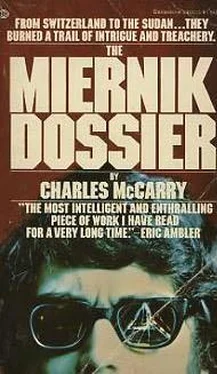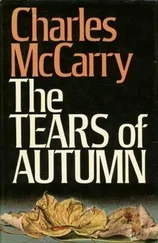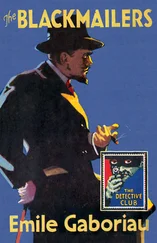I felt grass under my feet and turned around. The woods lay before us. Zofia began to run and I loped along behind her, carrying my rake at port arms. We entered the trees and kept going until we were well inside them. When we turned around, the searchlight on the tower had resumed sweeping. It was 11:14. The silence had descended again, and I heard a small noise from Zofia. She was pressing her fist against her cheek and biting her lip. I touched her face. It was wet with tears. She sniffed loudly and moved her head away from my hand.
We climbed up a bank onto the highway. Zofia removed her kerchief and shook out her hair. I was surprised to see that it fell to her shoulder blades. Tears were still shining on her cheeks when Miernik arrived seconds later to meet us.
He had come out from Vienna in a taxicab.
39. REPORT BY CHRISTOPHER’S CASE OFFICER.
1. This officer proceeded to Point Zebra (on the Austrian-Czech frontier) at 2340 hours on 16 June to await the arrival of Christopher and Zofia Miernik. Position was assumed in a wooded area overlooking the border, and surveillance was maintained continuously by this officer and one other officer from the Vienna station until 0005 hours on 17 June.
2. At 2400 hours, the time at which Christopher was supposed to cross the frontier, searchlights on the two watchtowers adjoining the crossing point were extinguished.
3. At 2402 hours, both searchlights were lighted again, and a detachment of troops came into the cleared strip on the Czech side of the frontier. Approximately twenty men were involved. They carried out a thorough search of the area, including a wooded strip on the Czech side of the frontier.
4. It was assumed at the time that this search was directed toward the capture of Christopher and Zofia Miernik. No effective action to prevent this outcome was possible in the circumstances, and none was attempted by this officer.
5. This officer strongly recommends that the Vienna station undertake a reexamination of its relationship with the Czech officer commanding this sector of the frontier.
40. DISPATCH FROM THE AMERICAN STATION IN VIENNA.
1. The Czech officer commanding the frontier sector that includes Point Zebra has explained that he was aware that Christopher and Zofia Miernik had crossed the frontier earlier than the time arranged between him and the Vienna station.
2. His action in ordering a search of the area around Point Zebra therefore presented no danger to Christopher. The U.S. officers who had planned to meet Christopher on the Austrian side of the frontier had no knowledge of this at the time of the incident, and it is natural that they feared for Christopher’s safety.
3. In our opinion, there is reason for a continuation of the normal operational caution that this station has always exercised in its dealing with subject Czech officer. But we have no grounds for disillusion. His action had the effect of protecting his reputation with his superiors and also obliterated any traces of Christopher’s crossing over the plowed ground along the frontier. On balance we regard the futile search action ordered by the Czech as an intelligent ad hoc operation that protected his interests as well as our own.
41. FROM MIERNIK’S DIARY.
Reunion! There by the roadside were Zofia and Paul when I arrived in my taxi. The picture of them, and especially of Zofia with tears on her sweet face, rises out of the green ink with which I am covering this page. Until the moment I saw them I did not believe in my heart that they would be there. Even now, while Zofia sleeps in a room just down the corridor, I am not quite convinced that everything is as I know it to be-my sister safe at last and my friend out of danger. Of course I should have realized that Sasha would arrange everything perfectly. How many persons have had the gift of such a friend? He sent me no messages by Zofia. She was the message.
After the perfection of Sasha’s plan, my arrival on the dark road in a Viennese taxi seemed humorous to Zofia and Paul. The more I explained that I could not drive with my arm in a sling (and with no Austrian driver’s permit), the more they giggled. The taxi driver was befuddled by my instructions, but very glad to have the enormous fare. I gave him a very large tip in addition, so he went away as happy in his way as we were in ours. No doubt he put two and two together, but what does that matter? We will be out of Austria tomorrow, and we need never return.
Zofia has not changed at all. She is the same willful girl. It was my plan that she should go at once to Geneva and stay in my flat. I believe that Léon and Ilona would care for her until I am able to find a place for us to be together. But as soon as she heard of our trip to Sudan, Geneva was out. She insists on coming along. Paul merely shrugs when I discuss this with him. He agrees to discuss it with Kalash.
I have already made the mistake of mentioning the possibility to Nigel. Naturally he is opposed; I think perhaps he will change his mind when he meets Zofia. “This is not supposed to be an expedition on which one brings along one’s sister,” Nigel says. He points out the danger in the desert. He reminds me that Kalash speaks often of bandits. “You are putting your sister in danger of rape.” Actually I think he is just opposed to having to deal with another Miernik. I annoy him. It is more than his natural impatience now… Ilona. Poor Nigel has found that he is not so nonchalant about this girl as he thought. It is impossible to regret what happened between Ilona and myself. I am shocked that I should feel such indifference to my betrayal of a friend, but there it is-a truth to be faced.
Tonight I thought nothing could intrude on my happiness. I have not felt such emotion or known such serenity since I was a child. On my way to collect Zofia, all my life flowed by in my memory. She is the last link to that short interval of happiness that I knew (and Zofia was too young to know) between my birth and the war and Mother’s death. Zofia suffered more from Father’s death than I. All capacity for sorrow was lost to me when Mother was killed. I have never until now been able to think about the details of that death. I mean think in words. The picture is in my mind at all times, and I push it down a hundred times a day.
We are walking across the field. The earth is still cold after the winter. It is muddy-streaks of wet earth slimy under our feet. The daisies have opened, and also some yellow flowers that must have been jonquils. There are cattle in the next field. We walk into the woods and suddenly we are surrounded by a group of Polish soldiers-ragged and filthy. They call themselves partisans but in fact they are stragglers, semi-criminals who have seized on the war as an excuse for banditry. Father had explained this to me and now I see that what he said was true.
They are bold with Mother. One of them touches her on the breast and she leaps away and, holding my hand, begins to run. Behind us I hear the hard breathing of running men. Mother slips on a patch of mud and falls. There is a long brown streak on her skirt, like filth. I try to help her up. I feel a blow on the back of my head. They are all around us. Mother lies on the ground, panting, her eyes filled with-not fear but contempt. “Tadeusz,” she says, “go home. I’ll be along.” I am pulled to my feet and kicked on the tail of my spine. The pain is nauseating. I run into the woods and hide, covering my eyes with my hands.
I hear a burst of machine gun fire. I creep back and find my mother’s naked body. They have pulled her dress upward over her head, so her face is hidden. On her stomach are five tiny blue holes, and under her body a pool of red blood. Her legs are pulled apart as if they wanted to break them from her body. I find her underclothes and pull the torn cloth over her legs, to cover her. I lift her body and pull down her dress. Her hair is loose and stained with the blood she coughed into it.
Читать дальше












